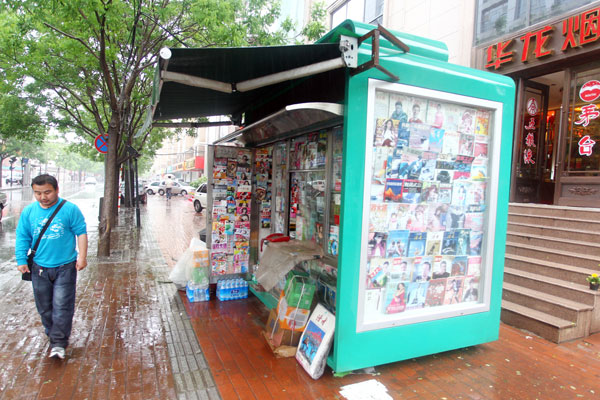Zhengzhou residents irate over newsstand ban
Updated: 2013-04-12 01:12
By Luo Wangshu in Beijing and Xiang Mingchao in Zhengzhou (China Daily)
|
||||||||
Qi Xin, an employee at an English training company in Zhengzhou, capital of Central China's Henan province, can no longer find anyplace that sells her favorite magazine, Youth Digest.
"I bought every issue of this magazine, but now I can't find a place to buy it," the 26-year-old said.
Qi is one of millions of Zhengzhou residents who is getting behind in their reading because city authorities decided to pull down all newsstands.
 |
|
Zhengzhou, Henan province, has taken down all 421 newsstands in the city. PROVIDED TO CHINA DAILY |
The last newsstand, at the intersection of Chengshi Huayuan Road and Hongqi Street, was torn down on April 2.
In April 2012, the Zhengzhou government decided to pull down the city's 421 newsstands.
Zhengzhou's urban management bureau, which was in charge of the initiative, claimed at the time that all newsstands were illegal constructions.
Beijing News reported in 2012 that no Zhengzhou newsstand had a license.
It also reported that in 2004, a total of 341 stands were licensed.
"Hearings were not needed for cracking down on illegal constructions," Han Yongjin, vice-director of the bureau, was quoted by the paper as saying. "Some newsstands extend to the street, occupy public spaces, sell refreshments, and hang posts. All affect urban planning, and should be cracked down on," a government notice by the bureau said.
The alternative idea the government offered was to move newspaper stands to supermarkets, a plan it called "move from the streets to indoors".
However, Qi doesn't like the alternative. "It is so inconvenient for me. I could get change at the stands before, but now I have walk miles to find a supermarket," she said.
Liu Hua, a 26-year-old resident in Zhengzhou, echoed Qi's sentiments.
"As an English major, I often read English newspapers. When I went to buy China Daily during summer vacation, I couldn't find any newsstands around. They were just gone without a trace.
"Finally, I had to walk hours in the sun in the middle of the summer day. It was not pleasant," said the graduate student from South Central University for Nationalities in Hubei province.
Authorities also claimed that some booths secretly sold pornography magazines.
Fan Yaobang, retired vice-chief planner of the Beijing Municipal Institute of City Planning and Design, believes the newsstands could be saved if planned well.
"The booths are convenient for residents. They can grab a newspaper when lining up for a bus, or during a walk after dinner," Fan said, adding that the booths can provide jobs.
"However, it is not OK to put them in the middle of the street, which may cause accidents or increase potential danger risks," he added.
Netizens claimed that the closures will affect the local newspaper and magazine businesses.
However, Nie Guangpeng, director of the circulation department of Henan Daily, said no circulation declines have been noted since the crackdown.
A Zhengzhou resident who gave only his online name, Shan Niufu, took photos of newsstands since the crackdown began.
Officials in some other provincial capitals are also bothered by newsstands. Authorities in Changchun, in Jilin province, and Yinchuan, in the Ningxia Hui autonomous region, announced plans in 2011 and 2012 to do something about them.
However, no other provincial capital has banned the stands so far.
Liu Dongwei, chief acting architect of the China Institute of Building Standard Design and Research, told China Daily that no other city has banned newspaper booths in China or abroad.
Hou Liqiang and An Baijie contributed to this story.

 Li Na on Time cover, makes influential 100 list
Li Na on Time cover, makes influential 100 list
 FBI releases photos of 2 Boston bombings suspects
FBI releases photos of 2 Boston bombings suspects
 World's wackiest hairstyles
World's wackiest hairstyles
 Sandstorms strike Northwest China
Sandstorms strike Northwest China
 Never-seen photos of Madonna on display
Never-seen photos of Madonna on display
 H7N9 outbreak linked to waterfowl migration
H7N9 outbreak linked to waterfowl migration
 Dozens feared dead in Texas plant blast
Dozens feared dead in Texas plant blast
 Venezuelan court rules out manual votes counting
Venezuelan court rules out manual votes counting
Most Viewed
Editor's Picks

|

|

|

|

|

|
Today's Top News
Boston bombing suspect reported cornered on boat
7.0-magnitude quake hits Sichuan
Cross-talk artist helps to spread the word
'Green' awareness levels drop in Beijing
Palace Museum spruces up
First couple on Time's list of most influential
H7N9 flu transmission studied
Trading channels 'need to broaden'
US Weekly

|

|







